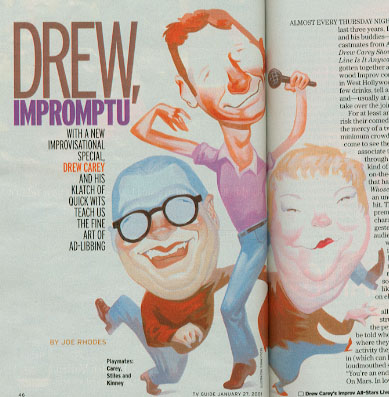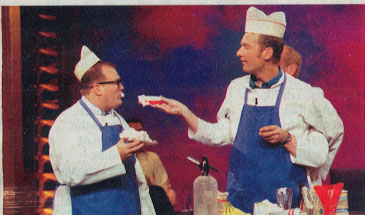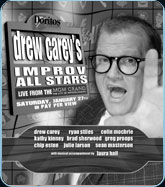
TV Guide, Jan. 27 - Feb. 2, 2001

Almost every Thursday night for the last three years, Drew Carey and his buddies - including castmates from ABC's The Drew Carey Show and Whose Line Is It Anyway? - have gotten together at the Hollywood Improv comedy club in West Hollywood to have a few drinks, tell a few stories and - usually at about nine - take over the joint.
For at least an hour they risk their comedy lives, at the mercy of a two-drink-minimum crowd that has come to see them free-associate their way through the same kind of make-it-up-on-the-spot games that have made Whose Line such an unexpected hit. They play off premises and characters suggested by the audience, saying whatever pops into their heads, no matter how ridiculous it sounds - sort of like Dan Rather on election night.

The games all have a basic structure, in that the performer must be told who they are, where they are and what activity they're engaged in (which can lead to such loudmouthed suggestions as "You're an endocrinologist. On Mars. In love with a Hostess Cupcake.") Carey, who had always been a stand-up comedian and had never done improv, was mesmerized by the well-honed abilities of costars Ryan Stiles and Kathy Kinney and decided he wanted to learn how to do it. So the Thursday night sessions began.
At first, they were joined by comedian and Drew Carey Show semi-regular Sean Masterson, an old friend of Stiles's. Members came and went, and more of Stiles's cohorts from the original British version of Whose Line - including Colin Mochrie, Greg Proops, and Brad Sherwood - joined in the Thursday-night-free-for-alls, now known as "Drew Carey, Ryan Stiles Totally Improv."

On January 27th, Super Bowl Eve, Carey and his gang, including Kinney and Stiles will be doing the first ever PPV improv special live from the MGM Grand in Las Vegas.
"It's taken a long time to get this together," Carey says, winding down at the Improv after another successful Thursday-night jam. "Nobody thought this could go. They kept telling me the only things that worked on PPV were boxing and wrestling and tough-man-fights."
"Which is why," Masterson breaks in, "we do promise to beat the crap out of each other."
But there's so much more to improvisational comedy than the occasional sucker punch or questionable body-part reference. ("It'll be like PG-13." Carey says. "You can watch it with your teenager.") With that in mind, we asked Carey, Stiles and Masterson to give us a brief improvisational primer.
TV GUIDE: The No.1 rule of improv is that you must never deny the words or actions of another player. Is that right?
MASTERSON: No.
CAREY: Yes, it is. You have to go along with the premise. And not only must you agree with it, you've got to add something to further the scene.
MASTERSON: Yeah, if the scene starts out on a space station, you can't suddenly decide you're in a Dairy Queen.
CAREY: My No.1 rule of improv is to make sure all the people onstage are better than me.
STILES: Not true!
TVG: Wasn't that denial?
STILES: Sorry.
TVG: How is improv different from stand-up?
CAREY: In stand-up, you know where the jokes will come. You get bigger belly laughs from improv, just 'cause you don't see 'em coming. The audience gives you more leeway. You don't get much forgiveness in stand-up. They know you've prepared that material, and if it stinks they go, "This is what he prepared?"
MASTERSON: The other difference is that you have to get used to the idea that there are other people onstage to help you. You have to learn to listen to your fellow players and appreciate what they are saying.
CAREY: I'm sorry, were you talking? I wasn't paying attention.
TVG: You seem to have different strengths. Ryan is really great at staying in character, no matter what. And when you do scenes with Colin, it does seem like you each know what the other one's going to say before he says it.
STILES: Well, we started together 22 years ago. That has something to do with it.
MASTERSON: And they once shared a liver.
TVG: Drew, on the other hand, seems most likely to laugh during a scene. Sometimes you're more like a member of the audience than a performer.
CAREY: That's my most annoying habit. I see myself laughing at the desk on Whose Line sometimes and I just cringe.
TVG: What's the one thing people really need to know to truly appreciate the art of improv?
CAREY: They just have to realize that it really is being made up on the spot, which is what makes it so amazing. When it's good, watching improv is like being at a party with really witty people going back and forth in a really funny way. And you get to be a part of it. And when I'm standing on the back of the stage, watching somebody else perform, that's how I feel. It's like, "Oh, my God. I can't believe I'm here. I'm like, the luckiest person in the world."